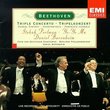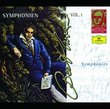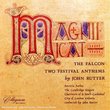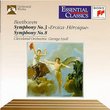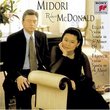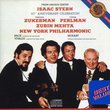| All Artists: Johannes Brahms, Glenn Gould Title: Brahms: 10 Intermezzi for Piano; 4 Ballades Members Wishing: 0 Total Copies: 0 Label: Sony Bmg Europe Original Release Date: 1/1/2002 Re-Release Date: 9/30/2002 Album Type: Import Genre: Classical Styles: Chamber Music, Forms & Genres, Ballads, Historical Periods, Classical (c.1770-1830), Modern, 20th, & 21st Century Number of Discs: 1 SwapaCD Credits: 1 UPC: 5099708785925 |
Search - Johannes Brahms, Glenn Gould :: Brahms: 10 Intermezzi for Piano; 4 Ballades
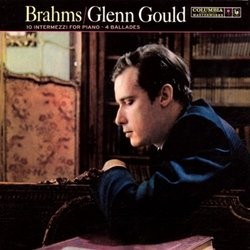 | Johannes Brahms, Glenn Gould Brahms: 10 Intermezzi for Piano; 4 Ballades Genre: Classical
|
Larger Image |
CD DetailsSimilarly Requested CDs |
CD ReviewsSurprisingly Exquisite and Tender Brahms JMB1014 | USA | 10/26/2004 (5 out of 5 stars) "This album is a delight. Seldom has Brahms, or Glenn Gould, sounded better. The tenderness and understated eloquence with which these pieces are rendered reaffirmed something I had always felt about Gould: that he was not out merely to vindicate an artistic credo, but to make beautiful music. He asserted he had enjoyed an opportunity to play these pieces in an improvisational style. If that's true, he should have improvised a lot more. There is a sweetness, lyricism and quiet romantic quality to these works and Gould brings them off tremendously. I have never heard them played better, more simply and sincerely, utterly free of affectation. There is nothing more lovely and calming than to play this just before going to sleep. (They sound just as good when you're wide awake.) Great as Gould was, this is pure ravishment." A surprising find Francesco Calegari | Evanston, IL | 01/15/2005 (5 out of 5 stars) "Brahms and Gould -- a surprising but effective match. From a performer most identified with Bach comes a recording that genuinely captures the Romantic expressiveness of Brahms. Although I knew many of these pieces from previous recordings Gould (as always) brings new ideas to the music. Of course, it wouldn't be Gould without the occasional idiosyncrasy -- op.119 no.1 is played ridiculously fast, for example." Hear this, love Kempff! SwissDave | Switzerland | 11/13/2007 (5 out of 5 stars) "Reading through all the reviews here, I noticed no one specifically refers to the one recording of the Intermezzi and Rhapsodies that to me is an indispensable reference point and to which one will return to again and again for a lifetime to nurture one's heart and soul: Wilhelm Kempff's earlier one from the 1950s on Decca (especially the Op. 116 Fantasias and Op. 117 Intermezzi from 1950).
Having said that, I love Gould and find his Brahms, with the exception of the 1st Piano Concerto elsewhere and the Op. 76 Intermezzo in A major here, very much worth listening to, the Ballades (and among those, the Second that Gould starts off as if awakening from a dream) in particular. They certainly form a worthy alternative to Michelangeli (the 1981 studio recording on DG, or as part of the 1973 Lugano recital on Music & Arts) - that is, assuming you, like me, like listening to alternative versions instead of only one. If Gould intended the Op. 76 Intermezzo to function as a strategically placed shock effect on this disc, that wears off in no time, and what remains is jarring and honestly confusing - as others have said here, this wonderful piece does not deserve to be treated like this. Greetings from Switzerland, David." |

 Track Listings (14) - Disc #1
Track Listings (14) - Disc #1